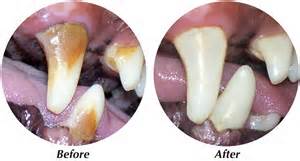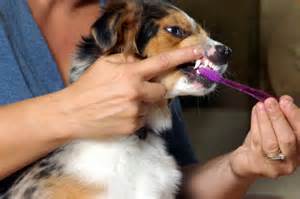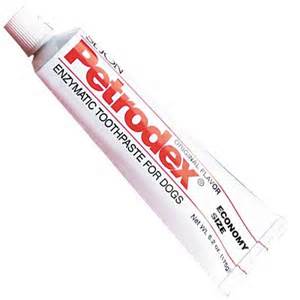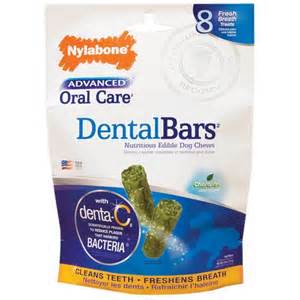Dental Care Keeps Dog Teeth Clean and Healthy
Dog Dental Hygiene Is A Must

Many dog owners fail to provide their dog with proper dental care. In the long run, this is not good as the dog’s health can be impacted by neglect of his dental hygiene. In most instances, dental hygiene for dogs is being overlooked at a great price.
Dogs do get bad breath and bacteria that can lead to gingivitis. Dog owners need to provide proper dental care for their dogs to prevent plaque and tartar from building up.
By providing your dog with the proper dental care you will also improve his overall health and save you lots of money later. Proper dental care is just as important as his nutrition, exercise, and routine dog grooming are.
This article will give you some tips on how to provide your dog with the proper dental care that can be done in your home.
The following topics will be covered for proper dental care for your dog:
- Observing Your Dog’s Dental Health
- The Dangers of Dental Disease
- Preventing Dental Disease in Dogs
- Final Tips
- Conclusion
Watch this video on how to brush a dog’s teeth.
When trying to do this for the first time, be aware that you may meet with some resistance from your dog or puppy. This is just a normal reaction to the treatment. However, over time he should become aware of this session and will accept it. It’s best to start when he is a puppy. As he gets older, he will be used to the brushing and the cleanings and should not give you any resistance.
Go back to Proper Dental Care For Your Dog
Back To Top of Page
Observing Your Dog’s Dental Health

Catching teeth problems early will help avoid severe dental disease later. The easiest way to keep track of your dog’s teeth is to look at them on a regular basis. Look for signs that may be a problem.
To inspect your dog’s teeth do the following :
- Lift the lips all around the mouth.
- Look at the front and back teeth closely as possible.
- Be gentle and use caution so that you don’t get bit.
- Your veterinarian will also examine your dog’s teeth during routine examinations.
Look for the following signs of possible dental problems:
- Halitosis (bad breath)
- Reluctance to chew/ cries out when chewing
- Increased salivation
- Red or puffy gums
- Bleeding gums
- Tatar / Calculus (hard coating on teeth that is usually brown or yellow; results from plaque build-up)
- Missing or loose teeth
- Anything else about the mouth that appears unusual
Contact your veterinarian if you should notice any of the above symptoms so treatment can commence to correct the problem.
Go back to Proper Dental Care For Your Dog
Back To Top of Page
The Dangers of Dental Disease
What are some of the dangers of dental disease? Plaque builds up on the teeth and turns into tartar, or calculus. These areas grow bacteria and eat away at the teeth and gums. Halitosis, periodontal disease, oral pain and tooth loss can occur.
However, the bacteria not only cause disease in the mouth – they can also affect other parts of the body, like the heart and kidneys. The most important thing to do is address dental disease as soon as it is detected, no matter how minor. Better yet, work hard to prevent it with regular tooth brushing.
It’s recommended to brush your dog’s teeth daily. If you have overlooked doing this, it’s highly recommended to begin his cleanings at once. You will meet with some resistance at first. Have is favorite treat available when he shows the proper behavior.
Go back to Proper Dental Care For Your Dog
Back To Top of Page
Preventing Dental Disease in Dogs

There are several things you can do to help keep your dog’s teeth in good shape and prevent dental disease in your pet. Start a dental care routine as early as possible in your dog’s life so he can get used to the feeling of having his teeth brushed and inspected. Puppies have 28 deciduous teeth that typically fall out by about six months of age. By this time, your dog should be getting his teeth brushed regularly.
If you decide to brush your dog’s teeth, here are some important tips to keep in mind:
- Never brush your dog’s teeth with human toothpaste – it can make your dog sick! Use special enzymatic toothpaste made especially for dogs. The same goes for oral rinses. Many of these items now come in different flavors that dogs like. Use only the one that your dog prefers and continue using that flavor for all tooth brushing sessions. You may have to experiment to discover which his favorite flavor.
- Plaque begins to turn into tartar / calculus within 24-48 hours, so daily brushing is recommended. Work your dog’s tooth brushing into your own routine – consider brushing his teeth around the same time you do yours so it will be easier to remember.
- Use a “finger brush” or special long toothbrush designed for use on dogs. When starting out with brushing, the finger brush can help ease your dog into it, as these do not feel as awkward as hard brushes.
- Before you begin, ask your veterinarian to show you some techniques to make tooth brushing easier on you and your dog. You can watch the video above to see how it’s done.

If you are not able to brush your dog’s teeth, there are other options. Consider using oral rinses made especially for dogs. You can also purchase special dental treats. Avoid real bones – not only can they lead to gastrointestinal upset, they may also cause tooth fractures.
Go back to Proper Dental Care For Your Dog
Back To Top of Page
Final Tips
It’s very important to make sure you keep up with his vet exams. The vet will examine your dog’s teeth as part of his routine examination. From time to time, a professional dental cleaning may be recommended. This requires general anesthesia. During the procedure, your dog’s teeth and gums will be examined closely for problems. The teeth will then be scaled and polished. If dental problems are noted, tooth extractions could become necessary.
Alternatively, you may be referred to a veterinary dentist for specialty procedures. Some dogs need dental cleanings one or more times per year, while others can go longer. Be certain to follow your vet’s recommendations. And remember, what you do at home can really make all the difference. By providing the proper dental care for your dog will go a long way for a longer and healthier life of your pet.
Go back to Proper Dental Care For Your Dog
Back To Top of Page
Conclusion
With the proper aids and a little patience, you can perform the duties of a dentist for your dog. Also, with a little practice, you will become more experienced in doing this and your dog will like you for it too.
As an Amazon associate, I earn from qualified purchases.
Go back to Dog.Dog Luxury Beds home page.
Go back to Proper Dental Care For Your Dog
